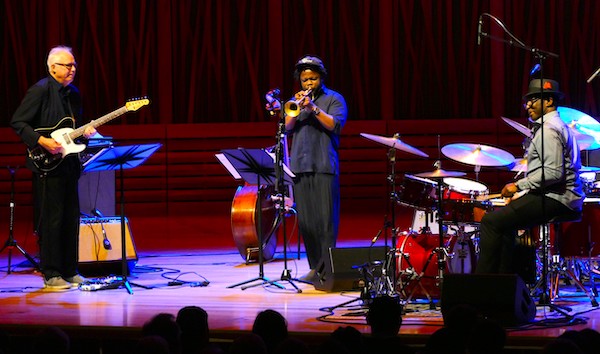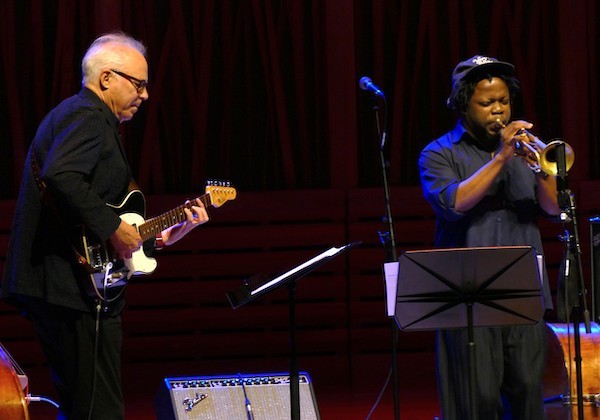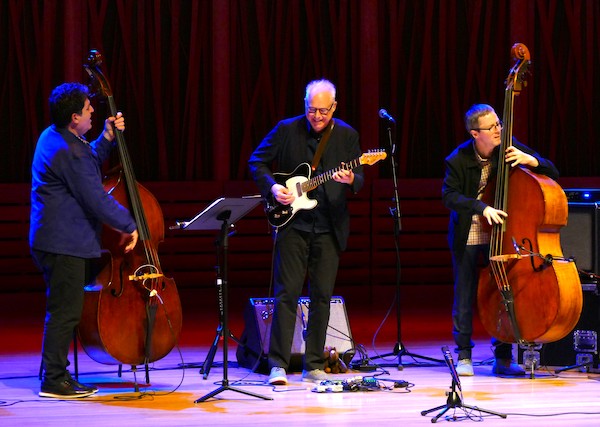Concert Review: Bill Frisell at the Groton Hill Music Center — Creating a World
By Paul Robicheau
Bill Frisell fans were blessed to hear the Denver-bred, Berklee-schooled guitar savant at a massive multispace facility that might offer the state’s most awe-inspiring concert hall.

Owl Song at the Groton Hill Music Center. Photo: Paul Robicheau
Bill Frisell occupies a world of his own on electric guitar. He slows down indelible melodies to find unusual tonalities in his sparely painted notes and chords, yet each sound delicately fits within the fabric of whatever’s going on around him.
Frisell fans were blessed to hear the Denver-bred, Berklee-schooled guitar savant in two separate settings at the Groton Hill Music Center on Thursday, performing with his own quartet as well as Owl Song, a new trio led by trumpeter Ambrose Akinmusire. The lofty, modern 1,000-seat venue only magnified the music, as the massive multispace facility (designed by the same architects of Rockport’s Shalin Liu Performance Center) might offer the state’s most awe-inspiring concert hall.
First up was Owl Song, completed by New Orleans drummer and longtime Wynton Marsalis associate Herlin Riley. Open space is generally a given in a trio, especially one that includes Frisell, and Akinmusire’s uncluttered vision bore out as their 55-minute set began with the meditative “Owl Song 1” (the opening track from an album due December 15), shuffling drums leading to soft trumpet and spartan guitar.

Bill Frisell and Ambrose Akinmusire at Groton Hill Music Center. Photo: Paul Robicheau
But personalities grew as the balance shifted among the three participants. Frisell began one song with ghostly refrains, Akinmusire another with a rich, rippling solo that sank into breathy squeals that tugged the tune into place. But surprisingly, it was Riley that made his presence most felt in this unlikely combination of voices, particularly in a central 25-minute segment. Again, it came in pieces, kicked off by Riley shaking and slapping a tambourine in an invigorating solo that moved to his bass drum and hi-hat. Five minutes later, Frisell picked his way into a loop that he topped with deep, ringing chords. And 10 minutes in, Akinmusire entered with a whinnying trumpet as Riley added little pops of rim shots and cowbell chatter. It was a hypnotic exercise in minimalism, borne through patience and punctuation.
Owl Song could have been a tough act for Frisell’s group to follow, especially given that Kenny Wollesen was a late scratch as its second drummer, shrinking the band from five to four musicians. Ruby Royston mostly provided a modest anchor at the single drum kit, while Frisell was flanked by two acoustic bassists, Thomas Morgan and longtime cohort Tony Scherr. The double bassists took the opportunity to embrace slightly different roles: Scherr often held the bottom while Morgan worked upper registers, yet he also enjoyed probing high notes that echoed Frisell’s melodies.
Frisell played a lot more loosely and a bit more aggressively than he did with Owl Song, prompting the bassists and drummer to leave plenty of space in their own dance. And the guitarist rarely paused between songs, segueing from one to the next, which only emphasized the performance’s whimsical nature. The lyrical melody of “Keep Your Eyes Open,” from Frisell’s 1997 Americana project Nashville, emerged early in the hour-long set. And his jazz inspirations also surfaced, from a teased Thelonious Monk progression in one tune to a heavier turn over a near prog-rock beat, as Frisell interpolated John McLaughlin’s “Follow Your Heart” by lacing in rawer chords and harmonics, breaking from his mellowed approach of recent years.

Tony Scherr, Bill Frisell, and Thomas Morgan at Groton Hill Music Center. Photo: Paul Robicheau
But the night concluded with classic pop-culture melodies reimagined through Frisell’s prism of tonal placement. In a skeletal treatment of John Barry’s James Bond theme “You Only Live Twice,” the guitarist engaged a loop to lightly brush notes over, while he and Scherr took turns recasting the song’s narcotic melody. And for an encore, Frisell brought a dreamy, subtly barbed touch to the Barbra Streisand hit “People,” caressing the melodic lift of the line “People who need people, are the luckiest people in the world.”
After taking bows with his band, the guitarist stepped forward with hands raised in a clasp and shyly gazed across the hall, surveying the people who were lucky to share sanctified space in the orbit of Frisell’s world.
Paul Robicheau served more than 20 years as contributing editor for music at the Improper Bostonian in addition to writing and photography for the Boston Globe, Rolling Stone, and many other publications. He was also the founding arts editor of Boston Metro.
Tagged: Ambrose Akinmusire, Bill-Frisell, Groton Hill Music Center, Owl Song, Ruby Royston, Thomas Morgan
